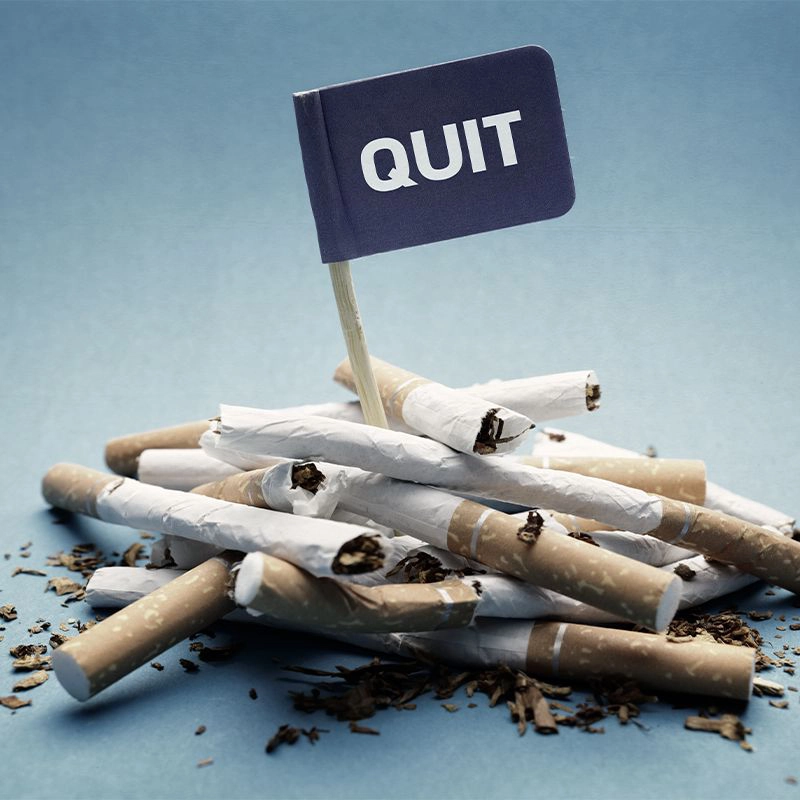Home/Wellness Zone/Sakra Blogs
17th Jun, 2020

Making resolutions every New Year is like a ritual that brings a sense of optimism and a feeling of control in our minds. Be it hitting the gym, eating healthy or quitting to smoke, these resolutions are promises to start anew and try to become the better and improved versions of ourselves. However, most of them are difficult to be kept and broken easily. Social science researchers call this the “False Hope Syndrome” where we set high yet unrealistic expectations. According to a study by the United Kingdom’s Royal Society of Public Health, “quitting smoking is the most difficult resolution to keep.” Despite the challenges, promising oneself to quit smoking is one of the most common, difficult and beneficial resolutions. And it’s all in the mind.
India is home to approximately 120 million smokers. Despite the various measures and initiatives taken up by the Ministry of Social Justice and Empowerment of India to reduce drug abuse, the incidence continues to grow. World Health Organization (WHO) stated that tobacco is responsible for an estimated 6 million deaths worldwide each year and out of the 12% of world’s smokers in India, 70% are men, and 13-15% women. It has also been estimated that about 90% of children under 16 years of age have used some form of tobacco in their past, and 70% are still using tobacco products.
In the wake of the COVID-19 pandemic, leading healthcare experts suggested that smokers are likely to be at increased risk of severe COVID-19, in comparison to non-smokers. Smokers have a history of suffering from severe respiratory illness by causing inflammation in the airways and COVID-19 can make it worse for them, thus suggesting that “now” is a particularly good time to kick the butt.
Smokers at higher risk of COVID-19 infection
Smokers during the act of smoking use fingers and possibly contaminated cigarettes, which increases the likelihood of transmitting the virus from hand to mouth. They may already be at risk of having reduced lung capacity or may suffer from underlying lung disease, use products such as common vapes or water pipes that can facilitate the transmission of COVID-19 in communal and social settings. COVID-19 is known to directly impact the lungs by reducing its capacity and limiting the intake of oxygen, thus leading to ARDS and pneumonia. Smokers with diabetes or hypertension are also at risk of succumbing to COVID-19, alongside individuals with asthma or wheezing problems.
Why is it hard to quit smoking?
A single cigarette contains about 10-12 milligrams of nicotine, making you consume about 1.1 to 1,8 mg of nicotine every time you inhale one. Nicotine is a highly addictive substance, similar to cocaine or heroin. When you smoke, the nicotine is mixed into the blood. When it reaches the brain, it releases dopamine, the feel-good hormone leaving you to feel pleasant, calm and happy. When the dopamine depletes, you are back to your original state and begin to yearn for that fresh flow of nicotine.
Nicotine acts as a stimulant. People usually smoke to increase concentration. They have trouble focusing when they do not smoke. When you stop smoking for some time, your body starts showing symptoms such as anxiety, frustration, anger, tremors, depression, insomnia, distraction, etc. These unpleasant withdrawal symptoms of nicotine often lead smokers to smoke again.
Difficult Roads Lead to Beautiful Destinations
Quitting isn’t easy. People usually turn to smoke as a coping mechanism, especially at stressful times. They usually cut down their intake before attempting to quit it all at once which often fails. During stress, it is better to try and flex other coping muscles. Counselling and medication can help redeem your chances to quit. On average, studies reveal, there are at least 6-11 attempts before they actually succeed. People who quit for even a short duration witness a quick improvement in their lung health. There is a real opportunity to break routines.
In the current scenario when a looming pandemic is threatening to wipe out human civilization, it is important to take actions that can enforce people to reduce and quit smoking. Heighten all campaigns against smoking and vaping. Recommend complete ban of using shared water pipes in cafes, bars, restaurants, etc. Any enforcement of the ban with adequate fines and penalties might encourage smokers to quit smoking.
If you are planning to quit smoking, you can follow the following.
1. Fix a date to quit smoking
2. Go on gradually reducing the number of cigarettes smoked per day and one fine day quit completely
3. It may take 3-4 attempts to quit smoking and hence don't be discouraged if you fail in one attempt.
4. Take professional help from a psychiatrist for smoking de-addiction
5. involve in healthy habits like exercise and yoga/meditation
6. Try to quit as a group if you smoke with your friends at work
7. Do not restart after quitting.
Nicotine Replacement Therapy – It is a medically approved method to help people quit. They come in the form of gum, lozenges, patches, and inhalers. Studies show that using nicotine replacement doubles your chances of quitting. It also helps reduce craving and withdrawal symptoms. One may consider taking nicotine replacement when you are ready to quit, need help with nicotine cravings or withdrawal symptoms and are not ready to quit the habit but not the substance.
If we negate the several malice of COVID-19, the time of crisis due to the pandemic can be considered as a time of opportunity. If you haven’t been successful in keeping your New Year promises, this is your redemption time. Because if you stretch yourself a bit more, you will treat your community well too.
Enquire Now
